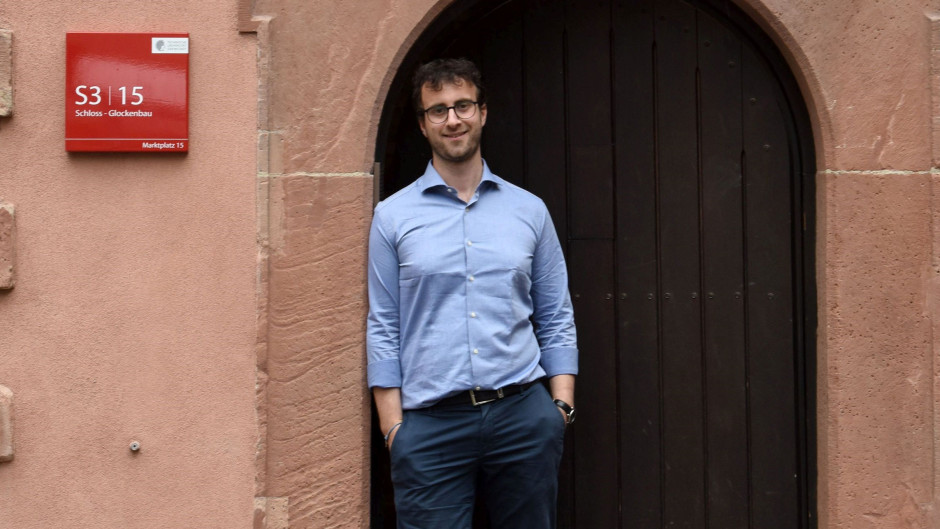Crossing between disciplines - TU researcher Dr. Marco Tamborini is building academic bridges between TU Darmstadt and Mainz and Frankfurt
How is biology becoming technology and technology biology? What does the architecture of evolution look like? These are the issues and themes that are being researched by Dr. Marco Tamborini, a research assistant at the Institute for Philosophy at TU Darmstadt. The young postdoc combines humanities and social sciences with the STEM disciplines. His main focus is the philosophy and history of science and technoscience. He has also taken on a role as a kind of ambassador for the Rhein-Main university alliance.
Marco Tamborini was already interested in philosophy during his schooldays in Italy. He read all of the theories and treatises published by Immanual Kant at great length. “A fundamental question investigated by Kant is the technology of nature”, he explains. A theme that he has been interested in to this day. Tamborini is especially interested in biology and its history and philosophy in the 19th, 20th and 21st centuries. After completing his bachelor and master’s degrees in theoretical philosophy at the Università degli Studi di Milano (University of Milan), he chose to move to the country of his role model Kant for his doctorate.
The deep time of the Earth’s history
Fascinated by palaeontology and the philosophy of evolutionary morphology – the study of the structure and form of organisms – he received his doctorate at the Ruprecht Karl University of Heidelberg for his work on the history of the geological deep time – a period of time millions or even billions of years ago in which slow evolutionary processes were taking place. “The deep time of the Earth’s history also influences the methodology used in palaeontology as a biological science”, explains Tamborini, who worked at the Max Planck Institute for the History of Science and then the Museum für Naturkunde Berlin during his doctorate.
The right address for the philosophy of technology
He became a research assistant at the Institute for Philosophy at TU Darmstadt in 2017. “TU Darmstadt is a super address for the philosophy of technology”, says Dr. Marco Tamborini. The specialist discipline of this 34-year old researcher is now the philosophy and history of science and technoscience. The transfer of knowledge between disciplines is also a recurring theme of his research, for example, the interface between the philosophical notions of machine, construction and organism, and biology, architecture, design and new technologies such as robotics, AI and 3D printing. “The blurring of boundaries is a huge theme”, he says, “biology is becoming technology and technology biology”. The postdoc was awarded the “Everett Mendelsohn Prize” by the Journal of History of Biology in 2017 and was honoured by the Italian Society of the History of Science in 2020 for his paper published in the journal History of Science. Tamborini is currently writing his thesis for his habilitation (qualification as a lecturer and professor) and a book on “The Architecture of Evolution”. In the book, he investigates and describes the philosophical and historical conditions for evolutionary morphology in the 20th century.
Research in Cambridge
The young researcher has also constantly crossed physically between scientific worlds and institutions. He received an Ernst-Ludwig mobility grant from TU Darmstadt and the “Association of Friends of the Technical University of Darmstadt” in 2019. The grant enabled him to work for several months as a visiting scholar at the Department of History and Philosophy of Science at the renowned University of Cambridge and at Clare Hall College Cambridge in England. In Cambridge, he carried out research for a chapter of his habilitation on British morphology and a technical, engineering approach to the organism – a return to Immanual Kant’s term, the “technology of nature”.
Tamborini is always searching for new perspectives offered by periods of research abroad. Or even those to be found at home: He spent some time in 2019 as a visiting scholar at Scuola Normale Superiore di Pisa in Italy.
Fellow of the Johanna Quandt Young Academy
He also recently became a fellow of the Johanna Quandt Young Academy at Goethe (JQYA) and a member of the Young Academy – Academy of Sciences and Literature Mainz. Therefore, he is a perfect ambassador for the RMU Alliance between the Rhine-Main universities of TU Darmstadt, Goethe University Frankfurt and Johannes Gutenberg University Mainz. His role in both academies is to exchange knowledge amongst researchers and to participate in workshops, working groups and conferences. Marco Tamborini describes it as “building bridges”. (alu)
- Links
- News TU Darmstadt

